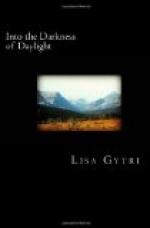She did not rightly interpret his suffering for her sake. She thought he meant his present pain, and she sought to soothe him as best she could without raising hopes which never could be realized. He understood her at last; knew the heart he offered her was cast back upon him, and rising from his kneeling posture, he felt his way back to his chair, and burying his head upon a table standing near, sobbed as Edith had never heard man sob before, not even Arthur St. Claire, when in the Deering Woods he had rocked to and fro in his great agony. Sobs they were which seemed to rend his broad chest asunder, and Edith stopped her ears to shut out the dreadful sound.
But hark, what is it he is saying? Edith fain would know, and listening intently, she hears him unconsciously whispering to himself; “Oh, Edith, was it for this that I saved you from the Rhine, periling my life and losing my eyesight? Better that you had died in the deep waters than that I should meet this hour of anguish.”
“Richard, Richard!” and Edith nearly screamed as she flew across the floor. Lifting up his head she pillowed it upon her bosom, and showering kisses upon his quivering lips, said to him, “Tell me— tell me, am I that Swedish baby, I that Eloise Temple?”
He nodded in reply, and Edith continued: “the child for whose sake you were made blind! Why have you not told me before? I could not then have wounded you so cruelly. How can I show my gratitude? I am not worthy of you, Richard; not worthy to bear your name, much less to be your bride, but such as I am take me. I cannot longer refuse. Will you, Richard? May I be your wife?”
She knelt before him now; hers was the supplicating posture, and when he shook his head, she continued,
“You think it a sudden change, and so it is, but I mean it. I’m in earnest, I do love you, dearly, oh, so dearly, and by and by I shall love you a great deal more. Answer me—may I be your wife?”
It was a terrible temptation, and Richard Harrington reeled from side to side like a broken reed, while his lips vainly essayed to speak the words his generous nature bade them speak. He could not see the eagerness of the fair young face upturned to his—the clear, truthful light shining in Edith’s beautiful dark eyes, telling better than words could tell that she was sincere in her desire to join her sweet spring life with his autumn days. He could not see this, else human flesh had proved too weak to say what he did say at last.
“No, my darling, I cannot accept a love born of gratitude and nothing more. You remember a former conversation concerning this Eloise when you told me you were glad you were not she, as in case you were you should feel compelled to be grateful, or something like that, where as you would rather render your services to me from love. Edith, that remark prevented me from telling you then that you were Eloise, the Swedish mother’s baby.”




